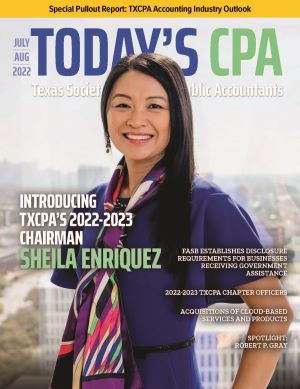FASB Establishes Disclosure Requirements for Businesses Receiving Government Assistance
ACCOUNTING & AUDITING COLUMN
By Don Carpenter, MSAcc/CPA
With the harsh economic environment created by the pandemic, governments around the world have been very proactive with regard to assistance provided to businesses in an effort to help them survive and encourage continued employment for the workforce. The extent of this assistance is evident in the $3.5 billion of pandemic support provided by the U.S. federal government in 2020 alone.
Surprisingly, GAAP does not provide direct guidance on how this assistance should be reported by the receiving businesses. To address this deficiency, the Financial Accounting Standards Board (FASB) issued ASU 2021-10 to establish disclosure requirements for business entities receiving government assistance.
The disclosures are intended to give investors insight into the impacts of such financial support and the related constraints or contingencies that may accompany it.
The enhanced disclosures are required for all enterprises except not-for-profit entities as defined by Topic 958 and employee benefit plans under Topic 960, 962 or 965. Affected entities are required to provide annual disclosure for any transactions with governments that are accounted for by applying grant or contribution accounting models. The disclosures must address:
1) The nature of the transaction and the accounting policy used to account for it.
2) The financial statement line items affected by the transactions and the amount involved.
3) Significant terms and conditions of the transactions, including commitments and contingencies.
The definition of what constitutes a governmental counterparty is quite broad. It may be a domestic or foreign government. In addition, the governmental unit can be federal, state, regional or municipal. Even quasi-governmental entities such as the World Trade Organization fall within the definition. Reporting entities would be well-advised to err on the side of inclusion with regard to qualified entities given the broad definition.
Although the definition of the governmental counterparty is quite expansive, FASB took a more limited view regarding what type of assistance would fall within the scope of the ASU. Transactions arising where the government is a customer or is legally required to provide a nondiscretionary level of assistance without specific agreement between the entity and the government are not included. Transactions within the scope of Topic 740 (Income Taxes) are also excluded.
These two exclusions should eliminate assistance structured as purchase/sale transactions or income tax credits. Finally, if the government assistance is accounted for in accordance with existing GAAP (such a contingencies), additional disclosure is not required.
With the above exclusions, the guidance reiterates that the new disclosure requirements apply to assistance that is accounted for under a grant or contribution accounting model. It gives examples of two types of transactions that would require disclosure:
1) A forgivable loan by a government that the business entity accounts for as a grant (such as the Payroll Protection Program). 2) A receipt of cash or other assets that the business entity accounts for as a contribution.
Due to the potential for various reporting entities to reflect similar governmental assistance differently, businesses are required to disclose the amounts received and the various line items in the balance sheet and income statement that are affected. This requirement is intended to allow investors to gain comparability across reporting entities.
The board included in this discussion a carve out for amounts not received but rather structured as reductions in previous arrangements, such as reduced sales taxes or lower interest charges due to loan guarantees. Although it is clear these reductions would impact certain line items in the financial statements, these impacts do not have to be disclosed due to the difficulty in ascertaining the amounts.
Finally, the entity is required to disclose any significant terms and conditions associated with the assistance received. As an example, if an entity is to receive a grant in increments over a period of time, that condition should be disclosed. Likewise, conditions such as maintaining an employee headcount or limitations based on a percentage of gross revenue would also constitute disclosable terms and conditions.
Affected entities raised concerns that disclosure of the amounts and significant terms and conditions may violate confidentiality clauses or require disclosure of proprietary information. In addition, there was concern that disclosure could impact future negotiations with governmental authorities or jeopardize future governmental spending. The board determined after a review of structured assistance programs that these concerns would only arise infrequently. If an entity does not comply with the required disclosures based on these concerns, it must still disclose the general nature of the information omitted and an explanation regarding why it is legally prohibited from meeting the requirements.
ASU 2021-10 is effective for annual periods beginning after December 15, 2021. Early application is permitted. The reporting entity is allowed to adopt the provision prospectively, but it must apply the requirements to any arrangements in place at the time of application and to new transactions entered into after the effective date. The disclosures are required to be made annually so interim reports need not include them.
As businesses prepare to comply with these disclosure requirements, they should review any continuing requirements associated with prior assistance where terms and conditions are still in effect and put in place systems for capturing the information across the enterprise prospectively.
About the Author: Don Carpenter is clinical professor of accounting at Baylor University. Contact him at Don_Carpenter@baylor.edu.






















